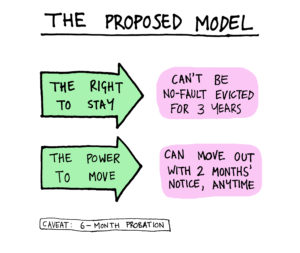After news coverage suggesting the government plans to introduce longer tenancies in the private rented sector, the consultation has come out with full details.
For years, we have been campaigning to increase the protection private tenants have from no-fault eviction. With more households becoming homeless after being evicted from a privately rented home than for any other reason, new safeguards are long overdue. So, with legal change on the cards, this is a major step in the right direction.
As ever though, the devil is in the detail. This is the first of two posts picking through the guts of the consultation, to look at exactly what it says. This post focuses on the new tenancy the government has proposed; looking at tenancy length, the probation period and limits on rent increases. The next post looks at proposals for putting it all into practice.
Three years long
The proposal is to introduce a new basic tenancy that would last for three years. But tenants would not be locked in for the full three years because, after the first six months, they would be able to leave at any time by giving two months’ notice.
 For the remainder of the three years, they couldn’t be evicted or asked to move out unless their landlord could evidence to a court that they had a good reason for it (e.g. significant rent arrears).
For the remainder of the three years, they couldn’t be evicted or asked to move out unless their landlord could evidence to a court that they had a good reason for it (e.g. significant rent arrears).
So, it would work a bit like a long employment contract, where you can’t be sacked for no reason, but you can move to another job by handing in your notice. You get the certainty of knowing that your home is your home for the long term – while knowing you’re not tied to it if something in your life changes. Compared to the current setup, this would be a major step forward.
At present, renters get only six months’ minimum protection from no-fault eviction (also known as a Section 21). This means that after six months, unless they’re in a fixed-term contract, their landlord can tell them to leave without providing any reason at all.
It would also give tenants more flexibility than they normally get now. Most private renters currently sign up for a twelve-month fixed-term contract. These contracts give them more certainty than the legal minimum but lock them into renting the home for the full year. The government’s plan to increase the basic minimum protection from eviction and allow renters to leave at any time by giving notice would end this annual renting cycle.
So, is it all roses? Not quite.
The longer contract is welcome, but when a child’s primary education is six years, three years isn’t enough. A quarter of all families are now bringing up kids in a privately rented home. They could still be left forced to move multiple times through the course of their child growing up. English renters would still be looking jealously over the border at Scotland, where all new private tenancies have been permanent since the end of 2017… And at much of Europe, where millions of tenants also enjoy permanent tenancies.
Probation period
Although the basic tenancy is three years, the government’s model includes a one-off break clause for both landlord and tenant after six months. If it wasn’t used, the tenant would automatically be protected for the next two and a half years (while being able to move out at any time by giving notice). In effect, this would act as a probation period for the tenant.
Along with the length of the tenancy, this probation period is also a question mark. There is a risk that some tenants could still lose their homes after six months without a good reason.
There isn’t much precedent for a probation internationally. When Ireland introduced longer tenancies in 2004, it had a similar concept, which it recently got rid of.
Rent increases agreed at the outset
For any longer tenancy, you need to have some way of protecting tenants from being evicted by the back door with a big rent hike.
The government’s proposal for certainty over future rents is that rents could only go up once a year, by an amount agreed at the start of the contract. If increases weren’t agreed, the rent couldn’t go up. But there would be no absolute limit on the amount that a rent could increase.
This would be a clear step forward from our current anything-goes system. But it’s also pretty soft. The good news is that tenants would know what to expect in future years, and only face one annual increase, maximum. The bad news is that, in high-demand markets, tenants will have limited bargaining power to accept anything but big increases.
It also compares fairly poorly to large parts of the rest of Europe and America, where private renters have much greater protection from big increases.
Altogether, then, when it comes to the specifics of the offer to tenants – three years, probation, rent increases by agreement – while it’s a huge step in the right direction, amendments are needed to genuinely protect renters and give them long-term certainty.
In the next post, we’ll look at how the proposals for implementation, so keep your eyes peeled.

